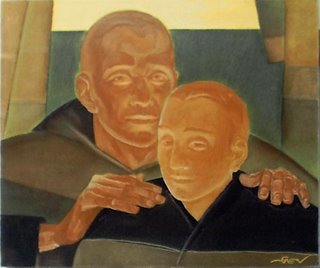 My father, I think, did not make a strong first impression. His name was unprepossessing. He was called Jack (or Jake) -- not Jacob, just Jack -- and he had no middle name or initial. He was of medium height, around five feet eight. He had a prominent nose and a well-formed chin and dark brown eyes. He was dark-complexioned. He was strong -- naturally thick in the chest and shoulders, I think, and probably made stronger by years of carrying rolls of cloth. He was a cutter in the garment industry. As a young man, he played baseball. I have a photo album that contains pictures of him playing the game when he was in his early twenties -- in the 1920s. He often used the word "powerful," and when he did he wasn't talking about someone who was a titan of business or a man to be reckoned with at City Hall; he was talking about someone who could lift the end of a car off the ground.
My father, I think, did not make a strong first impression. His name was unprepossessing. He was called Jack (or Jake) -- not Jacob, just Jack -- and he had no middle name or initial. He was of medium height, around five feet eight. He had a prominent nose and a well-formed chin and dark brown eyes. He was dark-complexioned. He was strong -- naturally thick in the chest and shoulders, I think, and probably made stronger by years of carrying rolls of cloth. He was a cutter in the garment industry. As a young man, he played baseball. I have a photo album that contains pictures of him playing the game when he was in his early twenties -- in the 1920s. He often used the word "powerful," and when he did he wasn't talking about someone who was a titan of business or a man to be reckoned with at City Hall; he was talking about someone who could lift the end of a car off the ground.When I was a child, I took it for granted, as children do, that my father was powerful in both senses of the word -- as well as being a lot smarter than most other people. (Any time I need confirmation of that, all I would have had to do was to ask him about current events. He had an encyclopedic knowledge of twentieth century politics.) He was not only the leader of our own family but was probably the most intelligent member of the family he had come from -- a youngest son whose father had died at a relatively early age. In a circle that began with his six siblings and included some of his other relatives, he appeared to be the most intellectually substantial person.
I remember the moment when it dawned on me that my father did not impress the world at large as a powerful figure. In my mid-twenties I was seeing a psychiatrist for whom I had little respect. I told him stories about my father. How my father never completed high school, despite the fact that he had an impressive intellect. How my father was sometimes dominated and humiliated by my mother's older sister. How my father worked in factory jobs his entire life. The psychiatrist said, "I have no respect for your father at all."
In novels of American strivers, the sort of realization I had in the psychiatrist's office can cause the hero to become disillusioned with his father or to resolve that he himself will, at any cost, be a person who commands attention. I didn't have that sort of reaction. I do remember the moment, but it was not a moment that changed my opinion of my father or changed the way I thought about myself. That may have been because in his own world he was a figure of such strength. It may have been because his values were so deeply embedded -- he had a stubborn confidence in their rightness -- that it would have seemed trivial to put much weight on how the world of less certain human beings might respond to him. The psychiatrist's observation only made me think less of him as a therapist.

1 comment:
A lesson in relativity (no pun intended!); point of view. Can you ever adopt any, other than your own?
Post a Comment